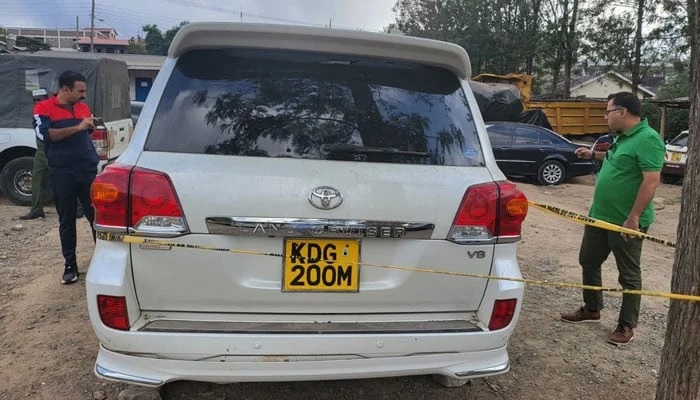Arshad Sharif's murder was 'planned': fact-finding team
Fact-finding committee's report calls into question driver Khurram's contradictory statements over journalist's killing in Kenya
Pakistani journalist Arshad Sharif was killed as part of a plan, according to details of the fact-finding committee's report on the journalist's killing in Kenya.
According to the fact-finding report, the statements of Khurram, who was driving the vehicle carrying the slain senior journalist in Nairobi, are full of contradictions and the Kenyan police did not provide any assistance in the investigation of Sharif's murder.
The report has been submitted to the Supreme Court, which took suo motu notice of the journalist's killing a day back. A copy of the report is also available with The News.
Sharif was shot dead in Nairobi on the night of October 23 under mysterious circumstances by the police. The local authorities claimed that the journalist was killed in a case of mistaken identity after which Kenya's Independent Policing Oversight Authority (IPOA) launched an investigation, the report of which has not been released yet.
Pakistan's fact-finding team under Federal Investigation Agency’s (FIA) Athar Waheed and Intelligence Bureau’s (IB) Omar Shahid Hamid, travelled to Kenya for an investigation and prepared a report.
The report stated that Sharif was issued a UAE visa on June 20, 2022 and the visa was valid until August 18, 2022. When Sharif went to Kenya, his visa had 20 days remaining and he applied for a new visa on October 12, 2022, but his application was rejected.
Driver Khurram's statements 'full of contradictions'
According to the fact-finding team's report, the statements of Khurram Ahmed — one of the key suspects in the case, who was driving Arshad Sharif when the incident took place —are full of contradictions while the Kenyan police did not provide any assistance in the investigation.
Waqar Ahmed — Khurram’s brother — who was hosting Sharif in Kenya, has also been named in the report.
The fact-finding report said that the trajectory of the bullet that went through Arshad Sharif’s chest from the back does not match the firing pattern.
“One bullet hit him in the upper back, about 6 to 8 inches below the neck and exited from the other side (chest). It is not difficult to deduce from the wound that it was a close-range shooting, while the angle at which the bullet was fired, it should have made a hole in the car seat as well.”
'Waqar Ahmed has links with Kenyan police, intelligence agencies'
According to the report, Arshad Sharif stayed at Waqar Ahmed's guest house for two months and three days.
It added that Waqar had close connections with Kenyan police and intelligence agencies, especially Kenya's National Intelligence Service (NIS).
The report quotes Waqar as saying that: "after the accident, the police handed him over Arshad Sharif's iPhone, iPad, wallet, and two USBs and he gave the iPhone and iPad to an NIS officer". A day later, the Pakistan High Commission sent an officer to collect Arshad Sharif's belongings, it must be noted.
According to the report, later Waqar called the NIS officer and told him about the development. Waqar told the investigators the NIS officer advised him against giving Sharif's belongings to the Pakistani High Commission, as per the report.
It adds that Pakistani High Commission officers found important evidence, which included two mobile phones, a computer, and a personal diary Sharif was using during his stay in Kenya.
The first three meetings with Waqar Ahmed were very helpful, the report said.
The fact-finding team also visited Sharif’s residence and found his passport and USBs, the report says.
Initially, the report added, Waqar was ready to give the CCTV footage of the residence to the Pakistani investigators; however, he later excused from doing so.
Waqar told Pakistani sleuths he did not share the footage with the local authorities as his lawyer and his wife had advised him against it.
-
Security forces gun down 30 terrorists in multiple IBOs in KP: ISPR
-
MQM-P calls for new province in Sindh
-
US report validates Pakistan military edge over India: PM
-
Banned TTP poses serious threat to Pakistan security: UNSC panel
-
CM Afridi clarifies remarks on by-poll after ECP requests army deployment
-
Dubai sees 3.2m Pakistani passengers in 2025 as airport sets new milestone
-
Security forces kill 23 Indian proxy terrorists in KP's Kurram
-
Pakistan to construct island to boost oil exploration: report












